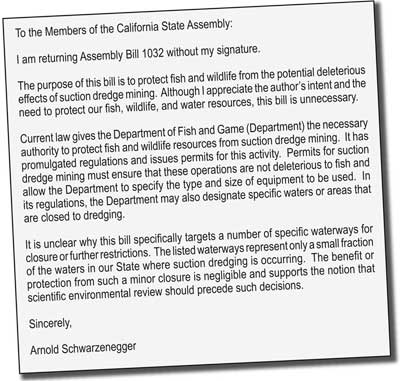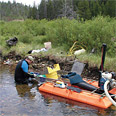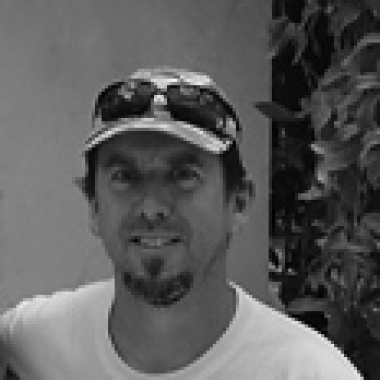All Articles
Legislative and Regulatory Update AB 1032—Where Do We Go From Here?
November 2007 by Scott Harn
• First, The Great News...
Governor Schwarzenegger vetoed AB 1032, California’s anti-dredging bill, on October 13, 2007. The governor explained his reasons for the veto in a letter to legislators.
We want to personally thank all of our readers who took the time to send a comment letter into the governor. We also wish to thank Public Lands for the People and New 49’ers prospecting club for their tireless efforts to defeat this bill.
For those of you who missed our earlier articles regarding AB 1032, a quick summary is provided.
The Karuk tribe of California twice attempted to shut down gold dredging in several California rivers via the courts. They failed on both attempts.
In the most recent case, the Karuk’s tried to negotiate a settlement with the California Department of Fish & Game (DFG) to close several rivers to dredging and place severe restrictions on others. Miners learned of the deal and intervened. On December 20, 2 006, Judge Bonnie Sabraw ordered the DFG to complete a new Environmental Impact Report before promulgating any new restrictions on suction dredging. She gave the agency 18 months to complete the new EIR. Dredging is currently regulated under an EIR that was completed in 1994.
006, Judge Bonnie Sabraw ordered the DFG to complete a new Environmental Impact Report before promulgating any new restrictions on suction dredging. She gave the agency 18 months to complete the new EIR. Dredging is currently regulated under an EIR that was completed in 1994.
The Karuks subsequently authored Assembly Bill 1032 and were able to get the bill introduced by Democratic Assemblywoman Lois Wolk. In addition to numerous other restrictions, the bill would have prevented the DFG from issuing a dredge permit unless the agency could show that suction dredging was not going to be deleterious to fish. A separate department review would have been necessary for every dredging site. Dredge fees would have been increased to $100 for a resident dredge permit or $230 if an onsite evaluation were necessary; a non-resident dredge permit was increased to $230, or $300 if an onsite evaluation were necessary.
The bill quickly made its way through the Assembly. An opportunity for public comment was available in the Senate before the Senate Committee on Natural Resources and Water. The committee chair, Democratic Senator Darrell Steinberg, would only allow two citizens to speak in opposition to the bill and he reduced their speaking time to two minutes. It became obvious he had already made up his mind to pass the bill on to the full Senate for a vote.
The bill moved to the Senate and passed with a majority vote, mostly along party lines.
Attorneys representing Public Lands for the People and New 49’ers met with Governor Schwarzenegger’s attorneys on several occasions. We here at the Journal sent out notices to over 3,000 subscribers and advertisers, requesting that letters be sent to Governor Schwarzenegger to encourage him to veto the bill.
• What's Next?
Judge Bonnie Sabraw ordered the DFG to complete a new Environmental Impact Report within 18 months of her decision. The decision was signed December 20, 2006, so DFG has until June 20, 2008, to complete the EIR.
We haven’t seen anything to support that DFG has begun the process of completing the EIR. In the meantime, the Karuks have filed another lawsuit against DFG because no funds have been allocated by the state for completion of the EIR, and with only eight months left until it’s due to be completed, it appears DFG will not meet Judge Sabraw’s deadline.
Public Lands for the People is participating in this new lawsuit, which was again filed in Judge Sabraw’s court for purposes of continuity. The first hearing was scheduled for the end of October. We will let you know what happened next month.
We need to continue to support volunteer organizations like Public Lands for the People. They have taken an active role in fighting unreasonable regulations. Jerry Hobbs, president of PLP, stated the organization will participate in the EIR and any subsequent lawsuits to ensure regulations are based on sound science.
Current dredging regulations are still in effect. These regulations prevent dredging from occurring during spawning seasons and include other restrictions to minimize possible harm to California waterways and the various species they support.
And we need to continue to educate the public. The goal of these tribes and environmental organizations appears to revolve around seizing control and making money. If they were serious about improving waterways they would be encouraging gold dredging when fish are not spawning. Yes, you read that right. Much of what a dredger does is actually beneficial to fish and their habitat, but the public is oblivious to this when they only hear the well-orchestrated campaigns from tribes and environmental groups. A dredge can break up compacted gravels and create small pools, providing better spawning areas for fish and cooler waters. And dredges provide the only economical method of removing mercury and other contaminants from waterways.
See page 21 if you wish to lend your support to Public Lands for the People.![]()
Wyoming—A Land That Time (And Explorationists) Forgot
 Wyoming is a vast state, covering nearly 260,000 km2 of surface area, which houses fewer people than most cities (less than 500,000 call Wyoming home). The state has no state income tax, is driven by taxes generated by the oil and gas...
Wyoming is a vast state, covering nearly 260,000 km2 of surface area, which houses fewer people than most cities (less than 500,000 call Wyoming home). The state has no state income tax, is driven by taxes generated by the oil and gas...
The Fine Art of Panning Heavy Sands
The fine art of panning heavy sands requires a measure of patience. If you enjoy panning gold, you ought to enjoy this too, once you get the hang of it.
Selenium, Mercury and Suction Dredging—Studies Contradict CA State Water Resources Board
Federal and state regulatory agencies often cite mercury and methyl mercury in our waterways as a major factor for further restrictions on placer mining, and on suction gold dredge mining, in particular. However, these regulatory agencies are minimizing selenium and its neutralizing effects.
The Business of Mining: Swap, Trade, or Exchange
With property values trending upward over the past several years, many owners who purchased their businesses years ago are now discovering that the building housing the mining operation or supply business is the most valuable part of their business.
Gold in the Drum Mountains
The Drum Mountains are located 23 to 30 airline miles northwest of Delta (pop. 2,000), in west-central Utah. The desert mountains rise to 7,233 feet and receive only 8 inches of precipitation a year.
Understanding Hard Rock Mining: Terms and Methods—Part I
While most small-scale prospectors and miners focus their energies on placer deposits, most large mining companies put their efforts primarily into hard rock mining. Although many miners may see these as two separate worlds that can never meet, a better understanding of hard rock mining for small operators can be very helpful in many ways.
National Hall of Fame Names 2017 Inductees
Subscription Required:
The Bawl Mill
• Ask the Experts
• Prairie Creek Project Approaches Final Hurdle
• A Golden Dream Come True
• Dawson City and the World Gold Panning Championships
• Journeys in the Kingman Quadrangle—Part IV
• Silver Bonanza in the Sierra Madre: The Glorious Past of Batopilas—Part II
• The Business of Mining—The Benefits of an S Corporation
• Melman on Gold & Silver
• Mining Stock Quotes and Mineral & Metal Prices
• The Risks of Mining Overseas
Free:








